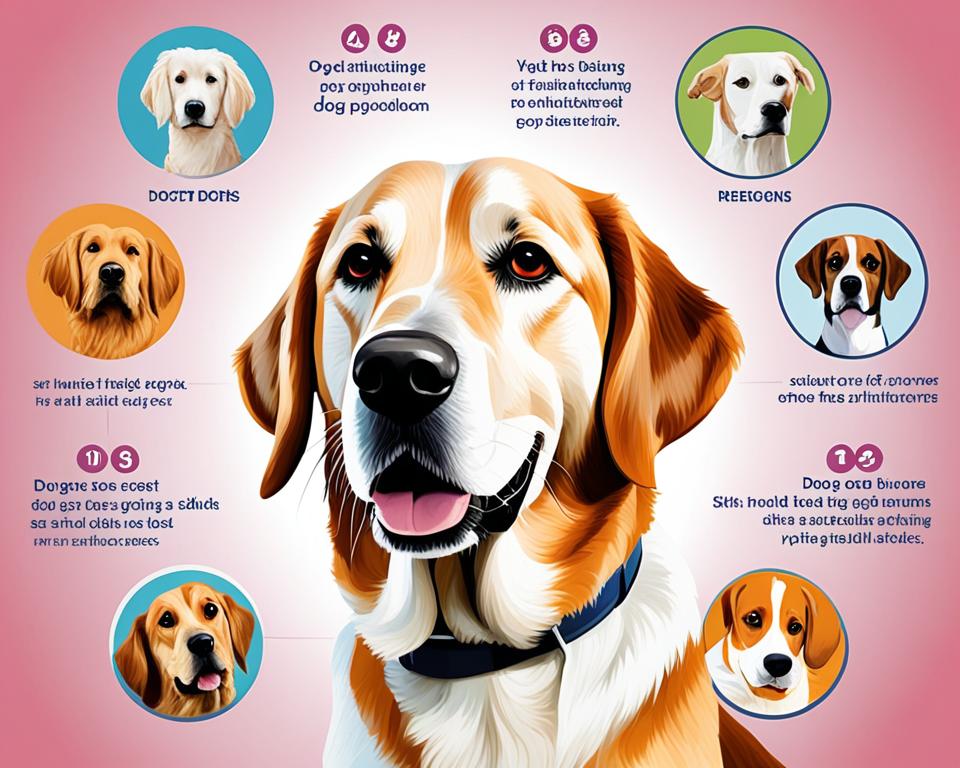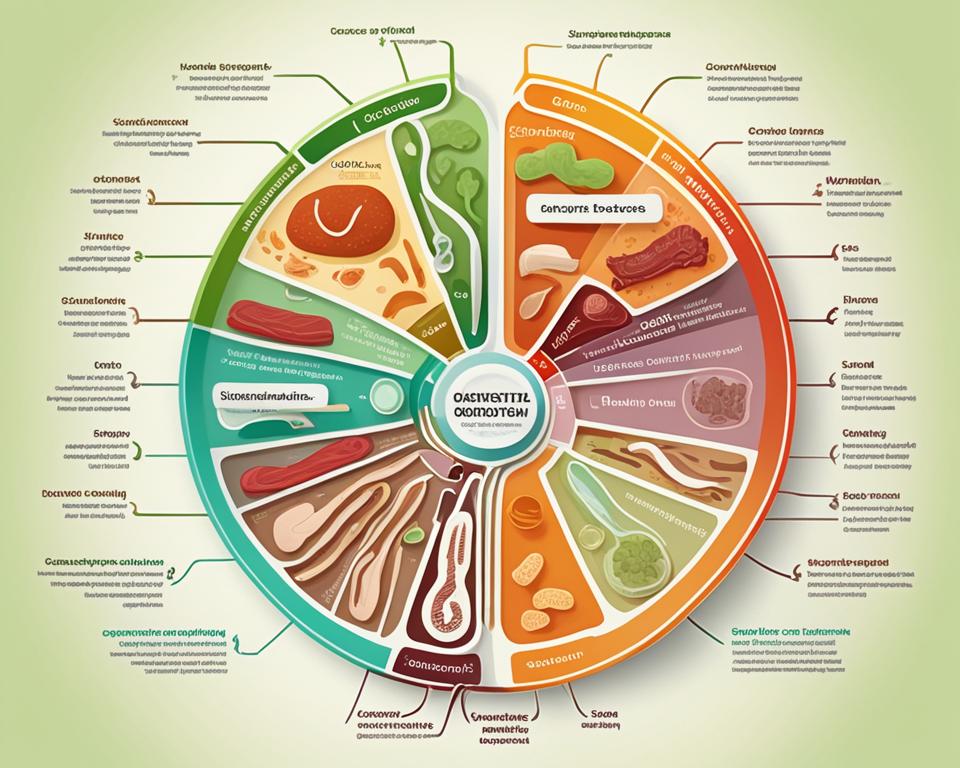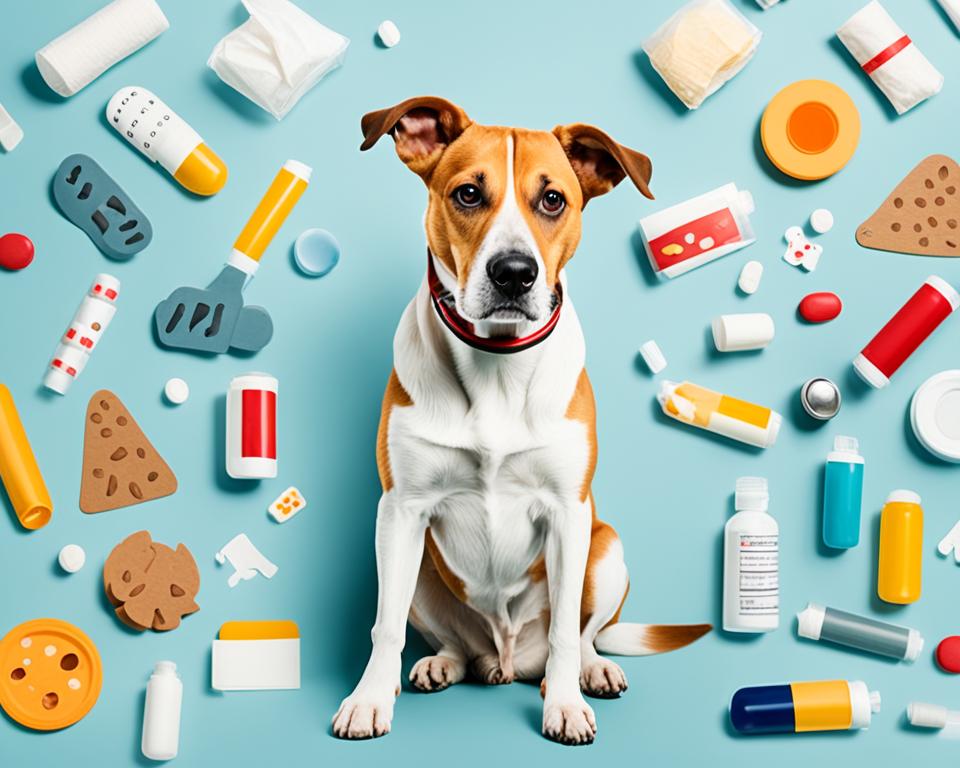As a dog owner, I know how important it is to keep our furry friends healthy. Dog health problems can sneak up on us. Our canine companions often hide signs of pain or discomfort.
Pet care isn’t just about feeding and walking our dogs. It’s about knowing common canine diseases and when to seek help. There are many health concerns that can affect our four-legged pals.
Early detection is key in managing dog health problems. Regular vet check-ups are crucial. But so is staying alert at home. Changes in energy, eating habits, or how our dogs move can signal a problem.
In this guide, I’ll share what I’ve learned about common dog health issues. We’ll look at symptoms to watch for, preventive measures, and when to seek vet care. This info can help keep your furry friend happy and healthy for years.
Understanding Common Dog Health Issues
As a dog owner, keeping our furry friends healthy is key. Pet health is very important. Knowing about common dog health issues helps a lot. Let’s talk about why catching problems early is crucial and how to know when our dogs need a vet.
Importance of Early Detection
Finding health problems early can save your dog’s life. Early detection often means better treatment. Regular vet visits are important for preventive care. Did you know 84% of Australian dog owners visit the vet yearly? That’s a good start!

Signs Your Dog May Need Veterinary Care
Watch for these warning signs:
- Changes in appetite or drinking habits
- Unusual lethargy or behavior changes
- Persistent vomiting or diarrhea
- Difficulty breathing or coughing
- Skin irritations or excessive scratching
If you see any of these, it’s time for a vet visit.
Role of Regular Check-ups
Preventive care keeps your dog healthy. Regular vet visits help spot problems early. For instance, 80% of dogs show signs of dental disease by age two. These visits can stop problems from getting worse. Investing in your pet’s health now saves money on treatments later.
“An ounce of prevention is worth a pound of cure.”
By being alert and scheduling regular vet visits, we can help our pets live happy, healthy lives. Early diagnosis and proper care are key to great pet health.
Skin Problems and Allergies in Dogs
As a dog owner, I’ve learned that skin issues are common in dogs. These problems can really affect their health. Let’s look into what causes and how to treat skin conditions in dogs.
Types of Skin Issues
Dogs can have many skin problems, from mild to severe. Some common ones include:
- Allergic reactions causing itching and rashes
- Yeast infections leading to irritated, discolored skin
- Bacterial infections resulting in sores and scabs
- Fungal infections like ringworm
- Parasitic infestations such as fleas and mites

Causes of Skin Allergies
Skin allergies in dogs can come from many things. This includes things in their environment, food, or flea bites. Atopic dermatitis is a hereditary condition found in some breeds. Flea allergy dermatitis is the most common skin disease in pets. It happens when dogs are allergic to flea saliva.
Treatment Options for Skin Conditions
There are different ways to treat skin problems in dogs, depending on the cause. Some treatments include:
| Condition | Treatment |
|---|---|
| Allergic reactions | Antihistamines, steroids, immunotherapy |
| Skin infections | Topical or oral antibiotics, antifungals |
| Flea allergy | Flea prevention, medicated shampoos |
| Atopic dermatitis | Allergen control, medications, immunotherapy |
Keeping your dog’s skin healthy is important. This means regular grooming, a good diet, and seeing the vet when needed. By catching problems early, we can help our dogs stay happy and itch-free.
Ear Infections and Dental Disease
Ear infections and dental problems are common in dogs. They can make dogs very uncomfortable. If not treated, they can get worse.
Otitis, or ear disease, is a big problem for many dogs. It’s especially true for dogs with floppy ears. Signs include shaking their head, scratching a lot, and discharge from the ear. Cleaning their ears regularly can help. But, always talk to a vet before using ear drops.
Periodontal disease is a big issue for dogs’ teeth. The American Veterinary Dental College says over 80% of dogs over three years old have it. This shows how important it is to keep dogs’ teeth clean.
Brushing their teeth often can help prevent dental problems. But, sometimes dogs need a professional cleaning. These can cost from $300 to $500 and might need anesthesia.
| Health Issue | Prevalence | Prevention |
|---|---|---|
| Ear Infections | Common in all breeds | Regular ear cleaning |
| Dental Disease | 80% of dogs over 3 years | Regular brushing, professional cleanings |
Ignoring ear infections and dental disease can lead to bigger health problems. Ear infections can harm the ear canal for good. Dental problems can make dogs more likely to get other diseases. Catching these early and taking care of them is important for your dog’s health.
Gastrointestinal Issues in Dogs
Gastrointestinal problems are common in our furry friends. About 20% of dogs face digestive issues at some point. It’s important for dog owners to know about canine digestion to keep their pets healthy.
Causes of Vomiting and Diarrhea
Dietary mistakes are a top reason for stomach upset in dogs. Stress from travel or big changes can also cause problems. Young puppies often get sick with diseases like Parvovirus.
Food sensitivities and inflammatory bowel disease can lead to ongoing issues.

Parasites and Their Impact
Intestinal parasites often cause stomach problems. Worms and other parasites can harm a dog’s digestive system. Luckily, most parasitic infections can be treated.
Regular deworming and check-ups help keep these parasites away.
Dietary Considerations for Digestive Health
Good nutrition is key for a healthy dog’s digestive system. Adding probiotics to their diet helps with gut health. Dogs with sensitive stomachs might need a low-fat, low-fiber diet.
It’s important to slowly introduce new foods to avoid upsetting their stomach.
- Offer small, frequent meals
- Choose easily digestible foods
- Avoid fatty treats
- Provide fresh, clean water
If your dog has ongoing stomach problems, see a vet. Early help can stop more serious issues later.
Musculoskeletal Problems and Obesity
I’ve seen how too much weight hurts a dog’s body. Being overweight is not just about looks. It’s a big health issue that can cause many problems, like musculoskeletal issues.
Arthritis is common in overweight dogs. The extra weight puts too much stress on their joints. This leads to inflammation and pain. Hip dysplasia, another joint problem, gets worse with obesity. Big breeds like German Shepherds are often affected.
Keeping a healthy weight is key for joint health. Studies show that heavy dogs often get arthritis. Being overweight makes them produce more pro-inflammatory substances. This can make joint problems worse.
- Over 50% of dogs in North America are overweight or obese
- Too much weight can shorten a dog’s life by up to two years
- About 20% of dogs show signs of osteoarthritis
To fight these problems, I suggest a mix of things. Diet is very important. Feeding them fresh foods with glucosamine and chondroitin, like bone broth, can help with pain and moving better. Exercise is also key, but start slow. Longer walks at a slow pace can help reduce inflammation and strain on joints.
Preventing problems is best. Regular vet check-ups and keeping your dog at a healthy weight can help keep their joints strong. If you’re worried about your dog’s weight or joints, talk to your vet.
Preventing and Managing Common Dog Health Issues
Keeping our furry friends healthy is very important. That’s why I focus on preventive care for my dog. I make sure they get regular exercise, eat right, and get their shots.
Exercise is key for my dog’s health. They get daily walks and playtime to stay fit and at a healthy weight.
What my dog eats is also very important. I feed them a balanced diet that fits their age and health needs. For older dogs, I choose special foods to help with health issues.
Vaccinations keep my dog safe from serious diseases like distemper, parvo, and rabies. I make sure they’re always up-to-date on their shots.
Seeing the vet regularly is a must. Annual check-ups help find problems early. The vet checks their teeth too, which is important since dogs often have dental issues.
“Prevention is more cost-effective than treatment.”
This saying is true for dogs’ health. By focusing on preventive care, I save money and give my dog a better life. It’s good for both of us, making our bond stronger.
Breed-Specific Health Concerns
Different dog breeds face unique health challenges. Bulldogs and Pugs often have breathing problems because of their flat faces. They may need special care for their breathing health.
German Shepherds and Labrador Retrievers can get hip and elbow dysplasia. This can cause joint pain and trouble moving as they get older. Chihuahuas might have dental issues or luxating patellas. Knowing these risks helps me take better care of my dog.
Some breeds also have heart issues, eye problems, and certain cancers. Boxers are more likely to get mast cell tumors. Doberman Pinschers might have heart conditions. Knowing these risks lets me work with my vet to catch and treat problems early. This keeps my dog healthy and happy for a long time.

